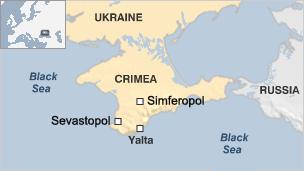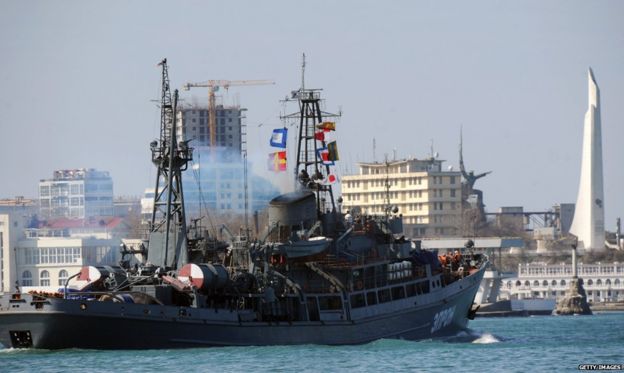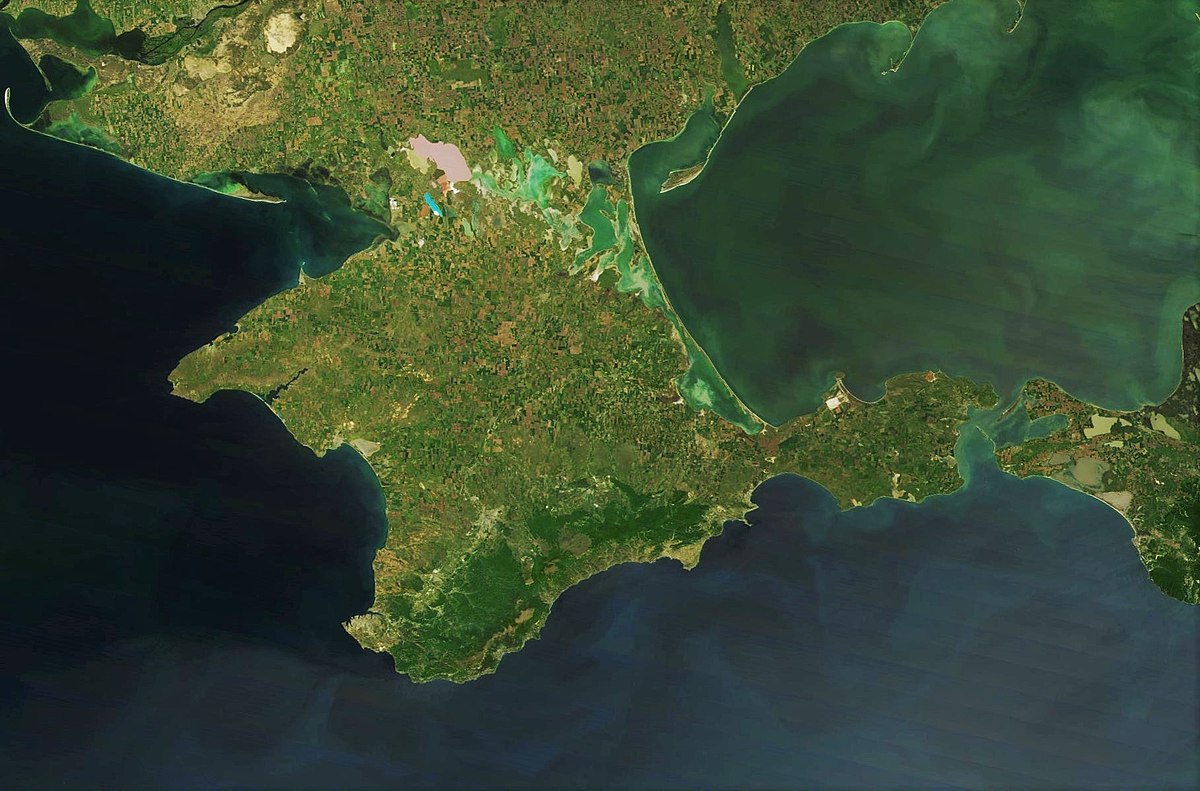By Eric Zhang and Maryna Parfenchuk
Ukraine has always been a nation torn apart by different superpowers and identities. For centuries, Austro-Hungarian Empire and Poland had governed its west, whereas its east had been under the control of Russia. That Ukraine falls within Russia’s influence is of major strategic importance for Russia, since Ukraine provides a buffer zone of almost one thousand kilometres in width between itself and Europe. Besides, the port of Sevastopol’ in Crimea is Russia’s only naval stronghold from which the fallen superpower can still wield its influence in the Black Sea and the Mediterranean Sea.

Source: BBC
The recent years have not been calm for Ukraine; after the former president Yanukovich resigned due to the pressure from the Revolution. The current Ukraine government have declared that the country has decided to go the “European way”, and align itself with the European Union. Consequently, its relation with Russia has deteriorated drastically. Should Russia lose its place in Crimea, it would be deemed by Russia as an unaffordable threat to its own military outlook and homeland safety.
Ever since Russia seized control of Crimea, both sides of the conflict have taken their own rhetoric. I interviewed one of the Ukrainian students Maryna Parfenchuk for a Ukrainian perspective on this issue.
Eric: The EU and US have imposed sanctions on Russian companies that have engaged in activities in Crimea, and a travel ban on some Russian individuals. Do you think this sanction would ever take effect?
Maryna: I don’t think the sanction would work, because in the past three years nothing actually changed. And we are in an inter-connected world, where the European Union is still dependent on Russia for oil and gas. I know there was a scandal with two Dutch companies involved in the construction of a bridge across the Strait of Kerch (note: which would connect the Northern Caucasus of Russia with Crimea), and some devices from Siemens were discovered as well. So, economic profit remains important even within the political context.
Eric: So what do you think of the future of Crimea? Do you think Crimea would ever be a part of Ukraine again?
Maryna: Personally, I really don’t think Crimea will be back as a part of Ukraine soon. If you look politically, Crimea is strategically very important for Russia. There was a deal between Russia and Ukraine in the 90s that Russia can use the port of Sevastopol’ as the base of its Black Sea Fleet, but the previous Ukrainian presidents had very strong ties with Russia and the Russian oligarchy. Now, when the revolution became serious and we wanted Yanukovich to resign, people wanted to join the European Union, and Russia was just provoked. In order to keep its power and secure itself for the future, Russia took over Crimea.
Eric: So how would you comment on Putin’s opinion that the fact that Crimea was given to Ukraine as a present by Khrushev in the past was a mistake, so it’s rightful for Russia to take it back?
Maryna: Actually the opinions in Ukraine were divided as well. People who are pro-Russian would say he is right. But people who are more pro-Ukrainian would say that you can’t just take presents back, and Crimea is geographically connected to Ukraine. Personally, I think that it’s just not right to try to correct the mistakes in the history. And if we really need to look into history, we should give it back to Tatars. In Soviet times, there was horrible repression towards the Tatars, Soviet regime deported all the Crimean Tatar population to Central Asia. And Russia has been claiming that there is a majority of Russian population in Crimea, whereas there was never a Russia population there in the first place. Logically, we should then just give it back to the people who were originally from there, but Russia wouldn’t take this into account. They just ignore part of the history in their favour. Personally, I don’t think the whole discussion about history is relevant when we are talking about territories. I think Putin’s speech was very manipulative, he tries to make the Russian people believe that Russia’s action is rightful.
Eric: In the 90s, Russia expected that there would be a buffer between itself and the West, and it expected that the West will respect its own “comfort zone” and sense of safety. However, this expectation was broken when the NATO expanded to Russia’s border, whereas Russia’s opinion was ignored. Do you think that Putin just took Crimea because strategically it is a threat to Russia if they do not, and Putin must do it as any rational leader would do?
Maryna: Well, Russia dared, and could take Crimea and with very little consequences from the international community. Russia certainly would not just leave it and wait until Ukraine invites all the NATO powers to stand right by its border. Russia would never risk its security like that.

Getty Images
Eric: So do you think that the people in Crimea really feel more Russian?
Maryna: It’s very hard to say, because the media in both countries are just so biased. The truth should lie somewhere in between. In Ukraine, there are people who actually feel more Russian, because in the East there are more Russian television and media, and these people’s family can be connected to Russia in a way. And old people sometimes think life in the Soviet times was better.
Eric: Putin compared the case of Crimea with Kosovo being separated from Serbia. Kosovo’s independence was against the Serbian law, as Crimea’s independence was against the Ukrainian law as well. However, Kosovo’s independence was declared not illicit according to international law by the international court. Putin thinks that this is a demonstration of America’s mentality of “Who’s not with us is against us.” (Кто не с нами, тот против нас.) The West seems to be quite hypocritical towards Russia, what do you think?
Maryna: Of course, it’s politics. Maybe I am too realistic, but I think behind any political move there is usually a political reason. You can’t just do something out of good will. I do think there is certain interest behind it all. However, even though Europe has been accusing Russia of illegal actions, they wouldn’t do something concrete to try to reverse the consequence of a political fact that already exists.
Eric Zhang, Class of 2019, is a Politics and Economics major from Shanghai, China – with special thanks to Maryna Parfenchuk!
Featured image: Satellite picture of Crimea, from Wikipedia.

